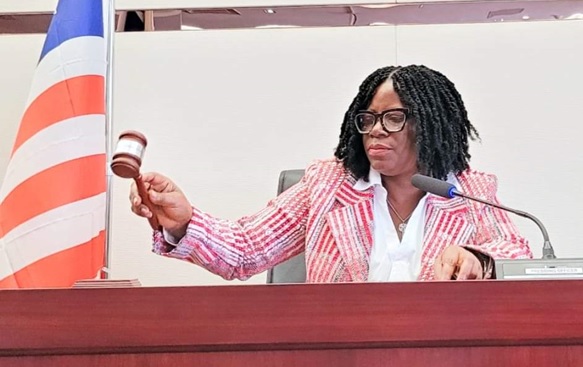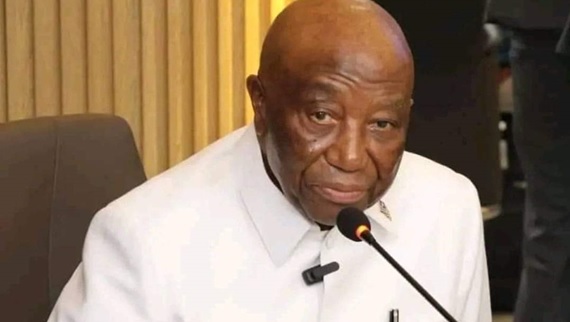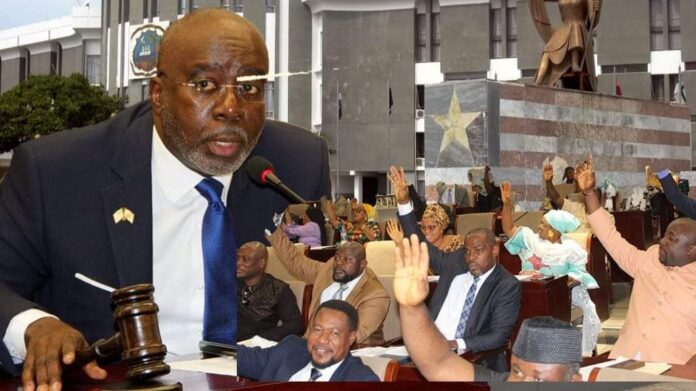MONROVIA – The Senate Public Accounts Committee has raised alarm over Liberia’s fiscal strategy for the first half of FY 2024, warning that reduced government spending may derail the country’s projected economic growth of 5.6% for the year. In a detailed review of the budget performance, the committee highlighted key concerns about declining revenues, underperformance in state-owned enterprises (SOEs), and the lagging disbursement of funds in critical sectors.
The report indicates that Liberia’s total revenue for the first half of FY 2024 reached $349.1 million. Of this, domestic taxes contributed $236.1 million, international trade/customs generated $108.7 million, and unclassified sources added $4.4 million. Despite these numbers aligning with overall targets, several worrying trends have emerged.
The economy is forecast to grow by 5.6%, but taxes like the Goods and Services Tax (GST), Corporate Income Tax (CIT), and withholding on services are falling short of expectations. Entities such as the Ministry of Foreign Affairs, Liberia Immigration Services, and the Ministry of Transport recorded sharp declines in revenue, signaling operational inefficiencies. State-Owned Enterprises continue to fall short of their budget contributions, despite their engagement in Corporate Social Responsibility (CSR) activities, which are diverting funds away from the government’s coffers. Although the Liberia Petroleum Refining Company (LPRC) reported profits, the Road Fund—a critical revenue source—has seen a troubling decline. Revenue from customs, an essential pillar of Liberia’s revenue stream, failed to reflect the country’s macroeconomic growth, prompting concerns about operational inefficiencies.
In response to these issues, the committee has called for swift reforms to ensure that the government’s revenue targets align with the country’s economic growth. The Committee on Public Corporations must strengthen oversight to ensure SOEs contribute adequately to the national budget. It also recommends implementing the CSR Framework and Dividends Policy as outlined in the Public Financial Management (PFM) Act. The Liberia Revenue Authority (LRA) needs to enhance compliance monitoring for key tax categories like GST, CIT, and withholding on services. Additionally, the administration of taxes for the Road Fund must be tightened. The committee recommended investigating the causes of revenue declines in key ministries and taking corrective actions to restore financial stability. The Senate called for a special hearing with the Minister of Finance and the LRA Commissioner-General to explain why revenue projections are underperforming despite the economic growth projections.
On the expenditure side, the committee reported total disbursements of $258.9 million out of the $321.5 million allotment, representing 80.5% of the half-year budget. However, spending has fallen 12% short of projections, with key concerns arising in wage disbursements and sector spending.
While $156.4 million was allotted for salaries, only 78.5% was disbursed, accounting for just 41.1% of the total annual wage appropriation. This has caused delays in civil servant payments, raising alarms about labor disruptions in the public sector. Critical sectors, including Agriculture, Health, Energy, and Infrastructure, received significantly less funding than anticipated, despite being highlighted as priorities under the government’s ARREST agenda. Compared to the same period last year, overall spending is down by 32%, with cuts seen in goods, services, and capital expenditures. These reductions threaten the government’s ability to meet development targets and address pressing socio-economic needs.
The Senate Public Accounts Committee has warned that without a more balanced fiscal approach, the government’s spending cuts could hurt businesses, reduce tax revenues, and negatively impact jobs. The committee emphasized the need for fiscal policy to support economic growth while maintaining prudence in spending to ensure Liberia can meet its development objectives. The Senate’s review of the budget performance underlines the urgency of addressing these fiscal imbalances, as Liberia seeks to stabilize its economy and promote sustainable growth in 2024.







